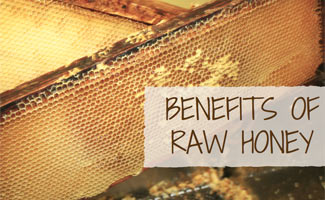Raw Honey Benefits: What’s The Buzz About?
 As one of earth’s friends, are you always looking for natural alternative remedies for common ailments? If so, do you know of the many health benefits of raw honey? Raw honey has played an integral role in holistic healing for more than 4,000 years. The processed honey you find today on most grocery store shelves is a far cry from its raw variety, particularly when it comes to the health benefits of raw honey — one of nature’s most nutritious delicacies.
As one of earth’s friends, are you always looking for natural alternative remedies for common ailments? If so, do you know of the many health benefits of raw honey? Raw honey has played an integral role in holistic healing for more than 4,000 years. The processed honey you find today on most grocery store shelves is a far cry from its raw variety, particularly when it comes to the health benefits of raw honey — one of nature’s most nutritious delicacies.
What Is Raw Honey?
| Editor’s Pick |
 Nature Nate’s Raw Honey Nature Nate’s Raw Honey |
Raw honey is, to put it simply, honey bee honey (nectar from flowering plants) in its most pure form. Worker bees gather the nectar and place it in their hive’s sacs (also called cells), where it mixes with acid secretions along with a reduction in moisture content until the sac gets sealed as honey. Raw honey is pure, unheated, unpasteurized and unprocessed. It’s the closest you’ll find to honey that exists in the hive or that’s been directly extracted.
How Does Raw Honey Differ From Processed Honey?
Most processed honey is heated above 118 F during production or storage, which, studies have shown, robs raw honey of some of its natural vitamins, enzymes, phytonutrients and other nutritional elements. While the U.S. Food and Drug Administration doesn’t have standards in place for raw honey, they have issued guidelines for processed honey. If, during the processing of honey, any sweeteners or syrups are added to the hive honey, manufacturers are now required to label their products as a “honey blend”. It’s a good step; however, most honey sold on store shelves is still heated to the point of reducing and even eliminating many of the health benefits you’ll get with raw honey.
The following video highlights the differences between raw and processed honey.
https://www.youtube.com/watch?v=LqGfo4qYliE
A Brief History Of Honey
Honey has been used for more than 4,000 years of recorded history as a medicinal natural remedy. Ancient Egyptians celebrated raw honey benefits and used it to sustain life and prepare for death. And in ancient Greece, Hippocrates used honey in most of his medicinal formulations, which continued on with Galen and Dioscorides (both medicinal greats in their time).
In the U.S., the history of honey is only several hundred years old. In the 17th century, European settlers brought over honey bees to the colonies, for their value in producing honey. But over the course of U.S. history, the medicinal benefits of honey haven’t continued to be recognized as “treatment” like it has with the rest of the world. Why? With the growth of Western medicine, which largely denounced what it considered to be “folklore healing,” honey fell by the wayside along with many other natural herbs and other naturally occurring elements from our environment.
Fortunately, there are still plenty of honey enthusiasts out there who promote honey as much more than just a sweet tasting food. You might be surprised at the many raw honey health benefits.
What Are The Health Benefits Of Raw Honey?
Raw honey benefits are enormous. Raw honey is packed with nutrients in their purest form. Honey is a natural antioxidant and contains vitamins, minerals, enzymes and amino acids that are all extremely important to our nutrition. Vitamins in honey include B6, niacin, pantothenic acid, riboflavin and thiamin. The minerals found in honey include calcium, iron, zinc, magnesium, potassium, selenium, phosphorus and more. And if that’s not enough, honey also contains antibacterial and antimicrobial properties.
Nutrients
It’s important to understand two major sources of nutrients that you’ll find in raw honey that get cooked away in the heating process with “processed” honey.
Bee Pollen
Honey bees collect pollen on their bodies when they’re extracting nectar. Bee pollen, often referred to as “nature’s most complete health food,” contains a lot of the vitamins, minerals, lipids, etc. that contribute to the healthy benefits of raw honey.
Bee Propolis
Bee propolis is a resin that honey bees collect from certain trees that they use to seal the hive together. Propolis has antiseptic, anti-bacterial, antioxidant and anti-inflammatory benefits.
Raw Honey Health Benefits
The following is a list of the most important health benefits of raw honey.
Antioxidants
Antioxidants help protect your body’s cells against free radicals, which are harmful molecules that cause cell damage. Many experts believe that free radicals contribute to cancer and atherosclerosis (blood vessel disease) and may also play a factor in the development of Alzheimer’s disease and arthritis-related conditions.
Topical Anti-Bacterial
Raw honey makes a great soothing topical treatment for minor scrapes, cuts and burns. Some data suggests that raw honey can help prevent infection because of its natural hydrogen peroxide properties. Several studies have shown that Manuka honey used in medical settings actually helps treat wounds by boosting healing time and reducing infection.
Digestion
Raw honey is good for your digestion, because it doesn’t ferment in your stomach. It can improve some digestive issues, including stomach ache, indigestion, nausea and constipation. Try taking one or two teaspoons on an empty stomach, or mix raw honey with ginger or lemon juice. Researchers have even proven that Manuka honey (from New Zealand) is effective in treating Helicobacter pylori (H. pylori), a common cause of peptic ulcers.
Sore Throat & Cough
Honey has been a long-time remedy for sore throats — just add honey and lemon to hot tea for fast relief. Have a cough associated with a cold? A 2007 Penn State study found that two teaspoons of straight honey can be as effective as dextromethorphan, a common cough suppressant ingredient found in many over-the-counter cough medications.
Blood Sugar And Healthier Weight Benefits
Honey may very well help dieters lose weight if used to replace other sweeteners. One tablespoon contains about 63 calories, so use it carefully. But honey, unlike other sweeteners, contains less of a glycemic load (comparable to a small banana) than processed white sugar. This lower glycemic content helps to control sugar spikes and elevated blood sugar (insulin) release in your body.
Does Raw Honey Pose Any Health Risks?
Although raw honey has good bacteria that promotes a healthy body, it can also contain botulism and other harmful bacteria. Botulism is especially dangerous for infants, so most health experts, including the Mayo Clinic, warn against giving even a taste of raw honey to children under one year old. Otherwise, raw honey is one of the most beneficial natural sources of nutrients.
Support Our Bee Population
Raw honey clearly has health benefits — some proven, some still in the early stages of research. Given its already proven benefits and those that are likely, it makes perfect sense to add raw honey to your dietary and medicinal treatment regimens. In addition to nutritional benefits, raw honey also has some beauty and cosmetic applications that can help you with the vitality of your skin and hair. Raw honey is organic, all-natural, and supports the beekeeping industry, which is essential to our earth’s natural balance. If you are interested in raising your own bees for your own uber local supply, check out our article on how to get started with raising honey bees.
What health benefits have you experienced with your use of raw honey?



